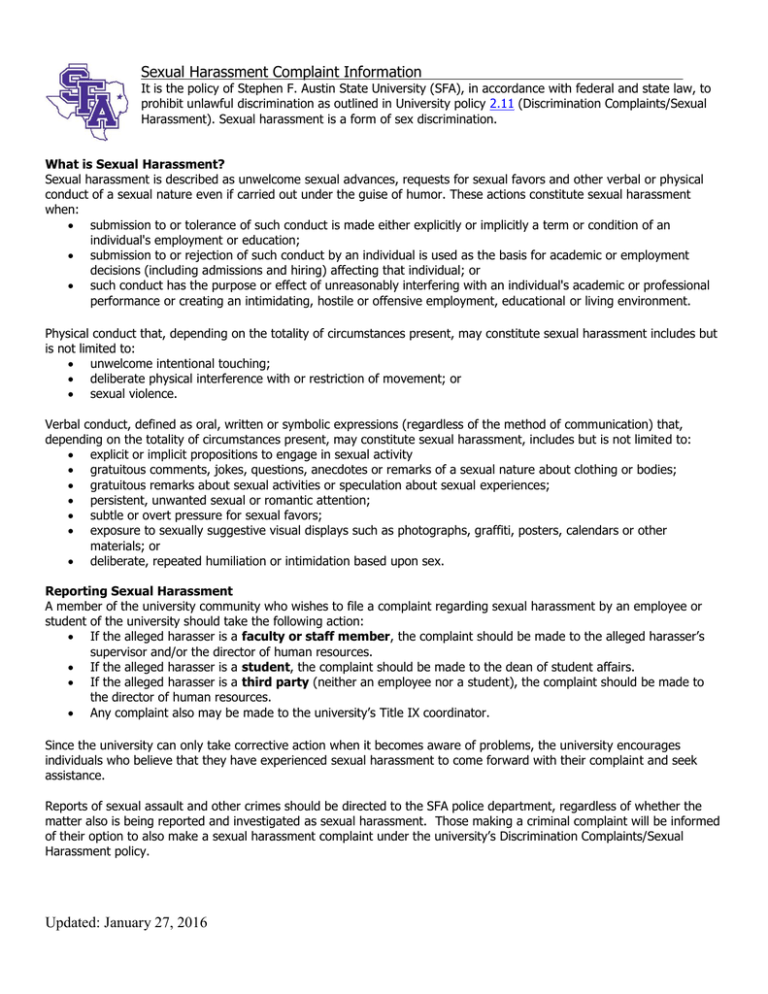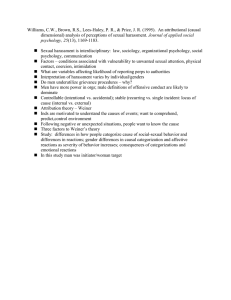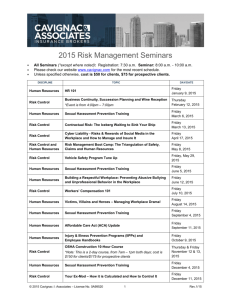
Sexual Harassment Complaint Information
It is the policy of Stephen F. Austin State University (SFA), in accordance with federal and state law, to
prohibit unlawful discrimination as outlined in University policy 2.11 (Discrimination Complaints/Sexual
Harassment). Sexual harassment is a form of sex discrimination.
What is Sexual Harassment?
Sexual harassment is described as unwelcome sexual advances, requests for sexual favors and other verbal or physical
conduct of a sexual nature even if carried out under the guise of humor. These actions constitute sexual harassment
when:
submission to or tolerance of such conduct is made either explicitly or implicitly a term or condition of an
individual's employment or education;
submission to or rejection of such conduct by an individual is used as the basis for academic or employment
decisions (including admissions and hiring) affecting that individual; or
such conduct has the purpose or effect of unreasonably interfering with an individual's academic or professional
performance or creating an intimidating, hostile or offensive employment, educational or living environment.
Physical conduct that, depending on the totality of circumstances present, may constitute sexual harassment includes but
is not limited to:
unwelcome intentional touching;
deliberate physical interference with or restriction of movement; or
sexual violence.
Verbal conduct, defined as oral, written or symbolic expressions (regardless of the method of communication) that,
depending on the totality of circumstances present, may constitute sexual harassment, includes but is not limited to:
explicit or implicit propositions to engage in sexual activity
gratuitous comments, jokes, questions, anecdotes or remarks of a sexual nature about clothing or bodies;
gratuitous remarks about sexual activities or speculation about sexual experiences;
persistent, unwanted sexual or romantic attention;
subtle or overt pressure for sexual favors;
exposure to sexually suggestive visual displays such as photographs, graffiti, posters, calendars or other
materials; or
deliberate, repeated humiliation or intimidation based upon sex.
Reporting Sexual Harassment
A member of the university community who wishes to file a complaint regarding sexual harassment by an employee or
student of the university should take the following action:
If the alleged harasser is a faculty or staff member, the complaint should be made to the alleged harasser’s
supervisor and/or the director of human resources.
If the alleged harasser is a student, the complaint should be made to the dean of student affairs.
If the alleged harasser is a third party (neither an employee nor a student), the complaint should be made to
the director of human resources.
Any complaint also may be made to the university’s Title IX coordinator.
Since the university can only take corrective action when it becomes aware of problems, the university encourages
individuals who believe that they have experienced sexual harassment to come forward with their complaint and seek
assistance.
Reports of sexual assault and other crimes should be directed to the SFA police department, regardless of whether the
matter also is being reported and investigated as sexual harassment. Those making a criminal complaint will be informed
of their option to also make a sexual harassment complaint under the university’s Discrimination Complaints/Sexual
Harassment policy.
Updated: January 27, 2016
The university can most effectively investigate and respond to alleged sexual harassment if the complaint is made as
promptly as possible after the alleged harassment occurs. Complaints must be made in writing and must be filed within
180 calendar days of the alleged violation.
Sexual Harassment by Third Parties
Although individuals who are not students or employees of the university are not subject to discipline under the
university’s internal processes, the university will take prompt, corrective action to eliminate sexual harassment and
prevent its recurrence when the third party has been brought into contact with the member of the university community
through a university program or activity.
If a university student believes that she or he has been sexually harassed in a university program or activity by an
individual who is not a university employee or student, the student should report the alleged sexual harassment to
the Title IX coordinator or the director of human resources.
If a university employee (including a student employee) believes that he or she has been sexually harassed within the
scope of his or her employment activities by an individual who is not a university employee or student, the university
employee should report the alleged sexual harassment to his or her supervisor, to the Title IX coordinator or to the
director of human resources.
Options Outside the University for Resolution of Sexual Harassment
Students may file complaints under Title IX with the Office for Civil Rights, U.S. Department of Education.
Faculty and staff members may file complaints under Title IX with the Office for Civil Rights, U.S. Department of
Education in certain circumstances, or under Title VII of the Civil Rights Act of 1964, with the U.S. Equal Employment
Opportunity Commission.
Processing Complaints
All complaints of alleged sexual harassment are investigated under the oversight of the university’s Title IX coordinator.
The university will process all formal complaints of sexual harassment it receives, regardless of where the conduct
allegedly occurred.1 The Title IX coordinator also may determine that an investigation is warranted without a formal
complaint if the university has sufficient notice that sexual harassment may have occurred or believes an investigation is
warranted, considering the circumstances.
1. Investigation Timelines
Timeframes for completion of each step of the investigation process are outlined in the Discrimination Complaints/Sexual
Harassment policy (2.11). Case complexity varies, and the length of time needed will depend on case circumstances;
however, an investigation should conclude under normal circumstances within 20 business days after it is assigned to an
investigator. The complainant and the respondent will be informed of any delay and an estimated date of completion.
1
The university generally does not investigate allegations of harassment or discrimination that fall outside the jurisdiction limits of the Discrimination
Complaints/Sexual Harassment Policy. Nevertheless, the university will process all complaints of sexual harassment, regardless of where the conduct
that is the basis for the complaint allegedly occurred, in order to evaluate whether there is a hostile environment on campus that would be contrary to
the university’s legal obligations.
2. Interim Measures
The university may take interim measures it deems necessary during an investigation. Interim measures will be taken
within the context of university policies and might include changes to class or housing assignments for students or work
assignments for employees.
3. Complaints in Which a Student is the Alleged Harasser
Complaints of alleged sexual harassment by a student will be initially investigated under the oversight of the university’s
Title IX coordinator. If that investigation results in a finding that university policy may have been violated, the complaint
will be processed and further investigated under the student code of conduct (10.4). It will be the prerogative of the
complainant to determine in what capacity he/she will participate; however, limited or no involvement by the complainant
could impact the ultimate finding of responsibility.
Updated: January 27, 2016
4. Complaints in Which an Employee is the Alleged Harasser
Complaints of alleged sexual harassment by a faculty or staff member will be investigated under the oversight of the
university’s Title IX coordinator. When a formal investigation is initiated, the deputy coordinator for faculty/staff/third
parties will work with the supervisor of the alleged harasser or, if the alleged harasser is the supervisor, with the
supervisor’s superior, to investigate the complaint.
Depending on circumstances of a particular complaint, the Title IX deputy coordinator for faculty/staff/third parties or a
designee may be the primary investigator of the complaint.
In addition to conferring with the Title IX deputy coordinator for faculty/staff/third parties, the responsible administrator
may confer with the Office of the General Counsel and with other academic or human resources administrators.
Investigations
Each complaint of sexual harassment must be evaluated with reference to the pertinent circumstances. On occasion, a
complaint may be resolved informally. Informal resolution efforts are voluntary, and either party may request that a
formal investigation of the complaint be commenced at any time. Informal resolution is facilitated by the Title IX
coordinator or designee and does not involve any requirement that the parties meet unless both parties request such a
meeting and the Title IX coordinator determines such a meeting would be appropriate. Informal resolution, such as
mediation, will not be used to resolve sexual violence complaints.
Complaints usually will result in investigations, including interviews and the review of evidence, such as electronic and
written material, if any exists. Both the complainant and the alleged harasser will be notified of the outcome of the
investigation. If it is determined that university policy has been violated, remedial action will be taken, including
disciplinary action, when appropriate, to eliminate the harassment and prevent its recurrence.
Confidentiality
The review of sexual harassment complaints, including formal investigation, will be conducted confidentially to the extent
permitted by law, except insofar as information needs to be disclosed so that the university may effectively investigate
the matter and take any appropriate corrective action.
Retaliation
Individuals who complain about sexual harassment or who cooperate in the university’s investigation and handling of
sexual harassment reports or complaints shall not be subject to retaliation for complaining or cooperating, even if the
university finds that no sexual harassment occurred. If a complainant or witness believes that she or he is being
subjected to retaliation, she or he should promptly contact the Title IX coordinator.
Cooperation
Members of the university community are expected to cooperate in the university’s investigations of alleged sexual
harassment. If cooperation does not occur, the investigation will generally proceed based on the information available.
University Action
When necessary to meet its commitment to provide an environment free of unlawful harassment, the university may
investigate alleged incidents of sexual harassment of which it becomes aware, even if no formal complaint has been filed
or the individual(s) involved is unwilling to pursue a complaint or cooperate in an investigation.
False Complaints
Any member of the university community who knowingly files a false complaint of sexual harassment or who knowingly
provides false information to or intentionally misleads university officials who are investigating or reviewing a complaint of
alleged sexual harassment is subject to disciplinary action up to and including discharge for employees and dismissal for
students.
Updated: January 27, 2016
CONTACT INFORMATION
SFA Title IX Coordinator
Dr. Michael Walker
Rusk Building, Room 301
1936 North Street
P.O. Box 13032
Nacogdoches, TX 75962-3032
Deputy Title IX Coordinator for Students
Dr. Adam Peck
Dean of Student Affairs
Baker Pattillo Student Center, Suite 3.105
P.O. Box 13066, SFA Station
Nacogdoches, TX 75962-3066
TitleIX@sfasu.edu
(936) 468-8292
Fax: (936) 468-6638
peckae@sfasu.edu
(936) 468-7249
Fax: (936) 468-7111
Deputy Title IX Coordinator for Faculty, Staff & Third Parties
Glenda Herrington
gherrington@sfasu.edu
Director of Human Resources
(936) 468-2304
Austin Building, Suite 201
Fax: (936) 468-1104
P.O. Box 13039, SFA Station
Nacogdoches, TX 75962-3039
Deputy Title IX Coordinator for Athletics
Loree McCary
Senior Woman Administrator, SFA Athletics
SFA Athletic Fieldhouse
P.O. Box 13010, SFA Station
Nacogdoches, TX 75962-3010
lmccary@sfasu.edu
(936) 468-3751
Fax: (936) 468-4052
Deputy Title IX Coordinator for SFA Charter School
Lysa Hagan
lhagan@sfasu.edu
CEO / Principal
(936) 468-5899
SFA Charter School
Fax: (936) 468-7015
2428 Raguet Street
Nacogdoches, TX 75961
Sexual Assault
To file a complaint of sexual assault, you may contact one of the coordinators listed or you may contact:
SFA Department of Public Safety
232 E. College St.
Nacogdoches, TX 75962
(936) 468-2608 (non-emergency)
(936) 468-2608 (emergency, from cell phone)
911 (emergency, from campus land line)
updemail@sfasu.edu
Comments or suggestions regarding this publication should be directed to the Title IX coordinator
This publication is reviewed annually, and an updated version is issued beginning June 1 each year. Changes may occur in the interim. The most
current version of this information can be found at www.sfasu.edu/universityaffairs/252.asp.
Updated: January 27, 2016





